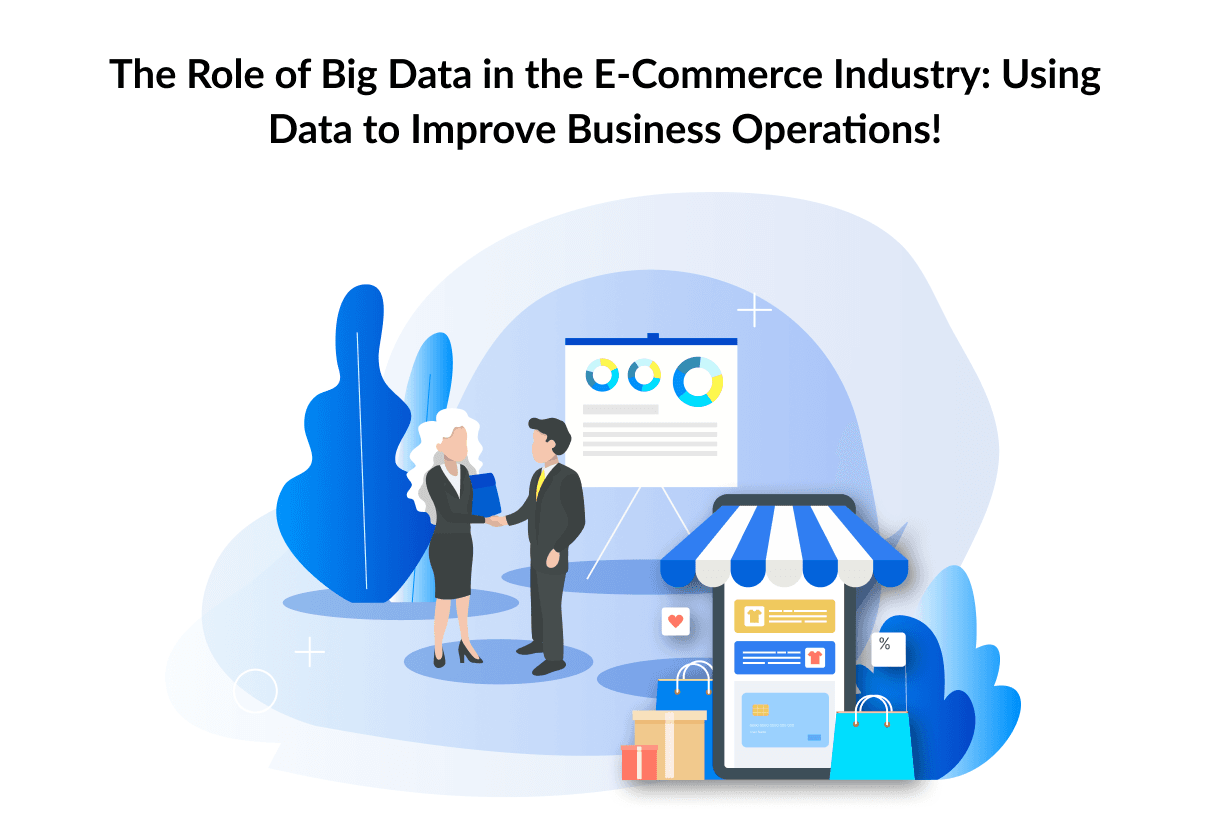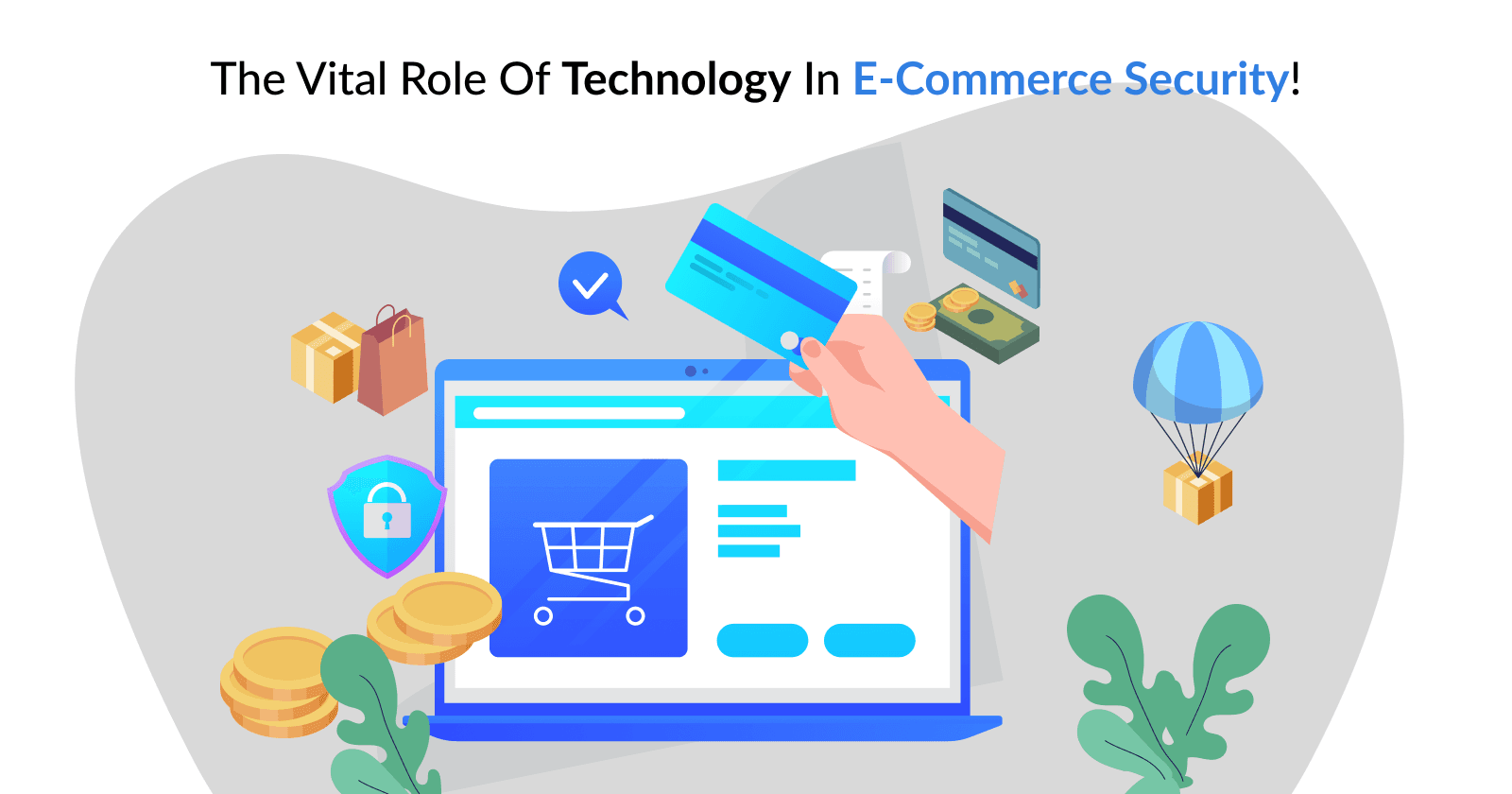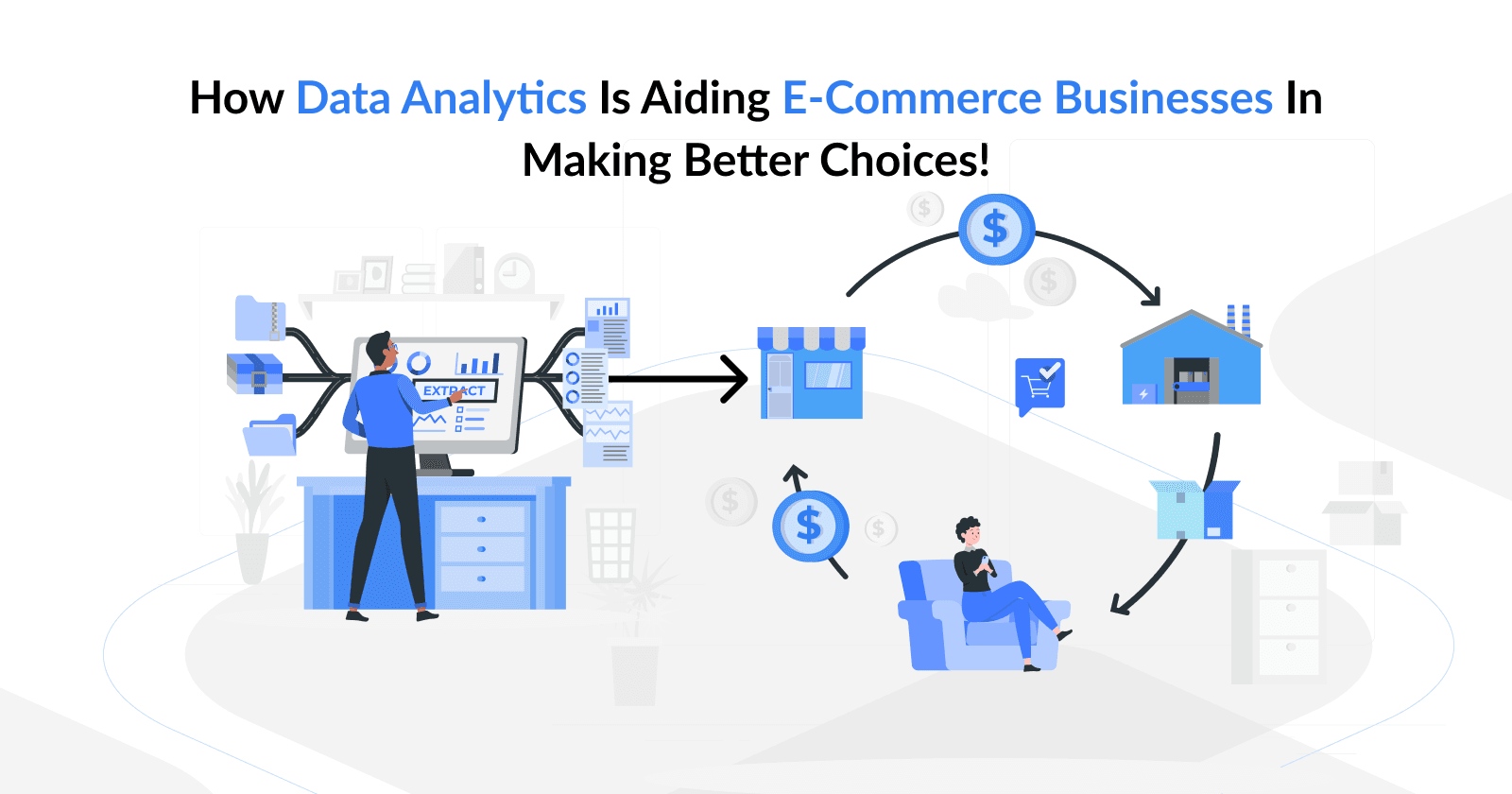Introduction
The rapid growth of e-commerce has made it an essential part of our daily lives. We use e-commerce platforms to purchase everything from groceries to electronics. However, with this growth comes the increased risk of cyber threats. Cybersecurity has never been more critical in the e-commerce industry than it is today.
The rapid growth of e-commerce has made it an essential part of our daily lives. We use e-commerce platforms to purchase everything from groceries to electronics. However, with this growth comes the increased risk of cyber threats. Cybersecurity has never been more critical in the e-commerce industry than it is today. The importance of cybersecurity in e-commerce cannot be overstated, as it ensures that sensitive data such as credit card details, personal information, and purchase history are protected from malicious actors.
In this blog, we will discuss the benefits, challenges, and opportunities of cybersecurity in the e-commerce industry.
Benefits of Cybersecurity in the E-Commerce Industry
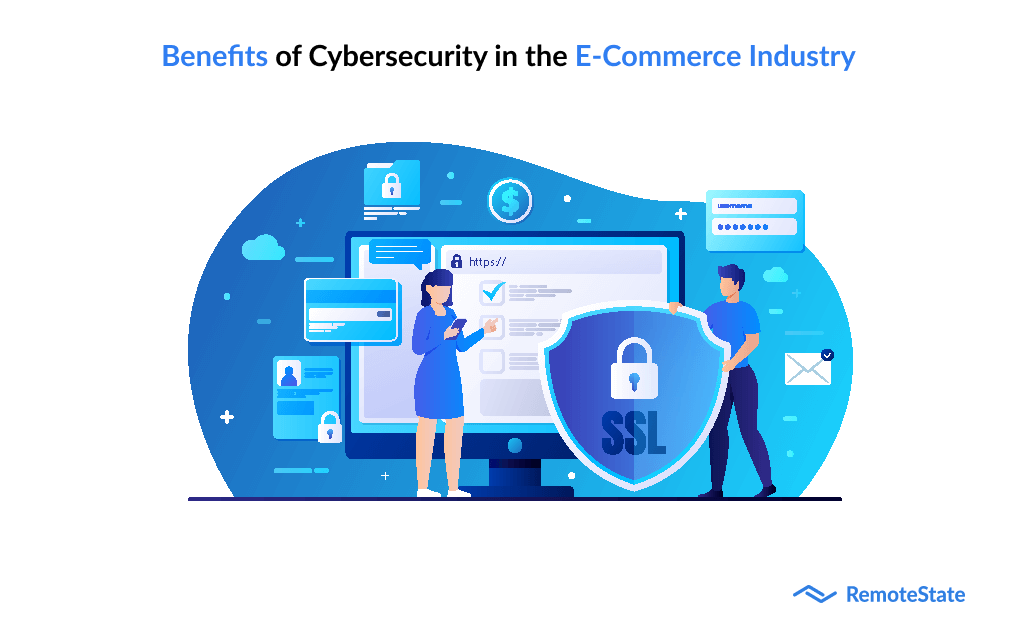
Protecting Customer Information
One of the primary benefits of cybersecurity in e-commerce is the protection of customer information. Customers trust e-commerce platforms to keep their sensitive information safe. When cybercriminals gain unauthorized access to this data, it can lead to identity theft, financial loss, and reputational damage. Implementing robust cybersecurity measures can help prevent these types of data breaches and build trust with customers.
Preventing Financial Loss
Another significant benefit of cybersecurity in e-commerce is the prevention of financial loss. When customers' financial information is stolen, it can lead to unauthorized purchases and chargebacks, which can be costly for both the customer and the e-commerce platform. Implementing cybersecurity measures can help prevent these types of financial losses.
Compliance with Regulations
E-commerce platforms must comply with various regulations regarding data privacy and cybersecurity. Failure to comply with these regulations can result in fines, lawsuits, and reputational damage. Implementing strong cybersecurity measures ensures compliance with regulations and helps protect against legal consequences. It also helps build trust with customers who expect companies to protect their personal information.
Reputation Management
Implementing strong cybersecurity measures in e-commerce also helps build a positive reputation with customers. When customers feel secure while shopping on a platform, they are more likely to return for future purchases and recommend the platform to others. This, in turn, can help build a loyal customer base and increase revenue for the e-commerce platform.
Enhanced Customer Experience
Cybersecurity measures also help enhance the overall customer experience on e-commerce platforms. When customers know that their information is secure, they feel more comfortable making purchases online. This can lead to increased customer satisfaction and loyalty.
Competitive Advantage
E-Commerce platforms that prioritize cybersecurity can gain a competitive advantage over their competitors. Customers are likelier to choose a platform that prioritizes their security and privacy over a platform that does not. This can help e-commerce platforms differentiate themselves from their competitors and attract more customers.
Challenges of Cybersecurity in the E-Commerce Industry
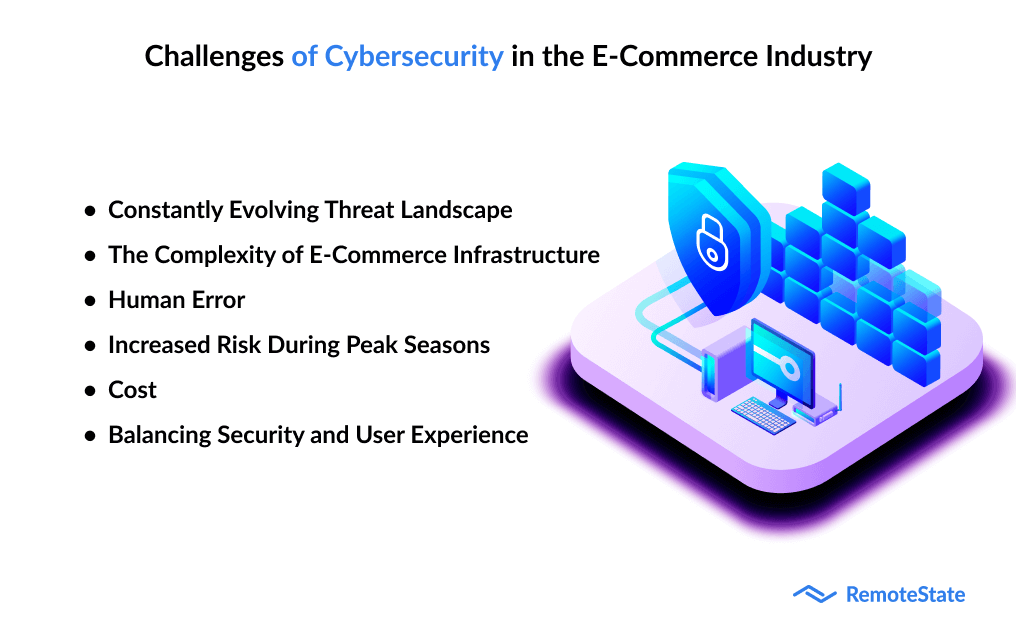
Constantly Evolving Threat Landscape
One of the most significant challenges of cybersecurity in e-commerce is the constantly evolving threat landscape. Cybercriminals are always developing new methods to gain unauthorized access to sensitive information. This means that e-commerce platforms must be constantly vigilant and adapt their cybersecurity measures to keep up with the evolving threats.
The Complexity of E-Commerce Infrastructure
Another challenge of cybersecurity in e-commerce is the complexity of the infrastructure. E-commerce platforms often have numerous systems and technologies that must work together to provide a seamless shopping experience. This can make it difficult to implement effective cybersecurity measures, as vulnerabilities can exist in any part of the infrastructure.
Human Error
Human error is another challenge that e-commerce platforms face when it comes to cybersecurity. Employees may accidentally or intentionally introduce vulnerabilities into the system. E-commerce platforms must provide training and awareness programs to ensure that employees understand the importance of cybersecurity and how to protect sensitive data.
Increased Risk During Peak Seasons
Cybersecurity risks can increase during peak shopping seasons such as Black Friday and Cyber Monday. During these periods, e-commerce platforms experience a surge in traffic and transactions, which can make it easier for cybercriminals to exploit vulnerabilities. E-commerce platforms must prepare for these peak periods by implementing robust cybersecurity measures and ensuring that they have enough resources to handle the increased traffic.
Cost
Implementing effective cybersecurity measures can be costly for e-commerce platforms, especially for small businesses. This can be a significant challenge for smaller e-commerce platforms that may not have the financial resources to invest in cybersecurity. However, the cost of a data breach can be much higher than the cost of implementing cybersecurity measures, making it essential for e-commerce platforms to prioritize cybersecurity.
Balancing Security and User Experience
E-Commerce platforms must balance security and user experience. Implementing too many security measures can lead to a cumbersome user experience, which can drive customers away. On the other hand, implementing too few security measures can leave the platform vulnerable to cyber attacks. E-commerce platforms must find the right balance between security and user experience to ensure that customers feel secure while shopping online.
Opportunities for Cybersecurity in the E-Commerce Industry
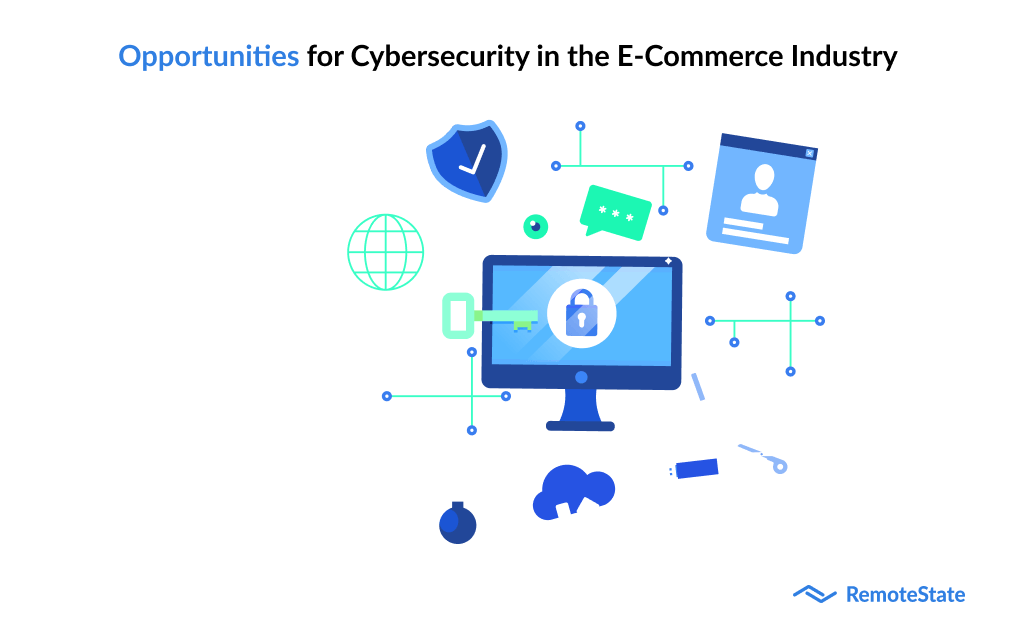
Innovation
Cybersecurity in e-commerce presents opportunities for innovation. E-commerce platforms can develop new technologies and methods to protect customer information and prevent cyber attacks. This can lead to new opportunities for growth and revenue for e-commerce platforms.
Job Creation
The demand for cybersecurity professionals in the e-commerce industry is growing. This presents an opportunity for job creation in the cybersecurity field, which can help drive economic growth.
Collaboration
Cybersecurity in e-commerce requires collaboration between various stakeholders, including e-commerce platforms, payment processors, and cybersecurity professionals. This presents an opportunity for collaboration and partnerships between these stakeholders, which can help improve cybersecurity across the industry.
Competitive Advantage
E-Commerce platforms that prioritize cybersecurity can gain a competitive advantage over their competitors. Customers are likelier to choose a platform that prioritizes their security and privacy over a platform that does not. This can help e-commerce platforms differentiate themselves from their competitors and attract more customers.
Customer Trust
Implementing strong cybersecurity measures in e-commerce can help build customer trust. Customers are more likely to do business with platforms that prioritize their security and privacy. This can lead to increased customer loyalty and revenue for e-commerce platforms.
Improved Reputation
Implementing strong cybersecurity measures can also help improve the reputation of e-commerce platforms. When customers feel secure while shopping on a platform, they are more likely to recommend the platform to others, which can help improve the platform's reputation.
Conclusion
In conclusion, cybersecurity is essential in the e-commerce industry. The benefits of cybersecurity include protecting customer information, preventing financial loss, complying with regulations, reputation management, enhancing customer experience, and gaining a competitive advantage. However, e-commerce platforms face challenges such as the constantly evolving threat landscape, complexity of e-commerce infrastructure, human error, increased risk during peak seasons, cost, and balancing security and user experience.
Cybersecurity in e-commerce also presents opportunities for innovation, job creation, collaboration, competitive advantage, customer trust, and improved reputation. E-commerce platforms must prioritize cybersecurity to protect customer information and build customer trust, which can lead to increased revenue and growth for the platform.
Protect Your E-Commerce Platform with Remotestate's Cybersecurity Solutions!
Remotestate offers cybersecurity solutions to help e-commerce platforms protect their customers' information and prevent cyber attacks. Our team of cybersecurity experts can conduct security assessments, develop strong password policies, and implement encryption for data in transit and at rest.
We can also provide employee training on cybersecurity best practices and collaborate with e-commerce platforms to find the right balance between security and user experience. With Remotestate's cybersecurity solutions, e-commerce platforms can gain a competitive advantage, build customer trust, and prevent costly data breaches.
FAQs
What is cybersecurity in e-commerce?
Cybersecurity in e-commerce refers to the measures taken to protect customer information, financial transactions, and other sensitive data from cyber threats such as hacking, data breaches, and identity theft.
What are the benefits of cybersecurity in e-commerce?
The benefits of cybersecurity in e-commerce include protecting customer information, preventing financial loss, complying with regulations, reputation management, enhancing customer experience, and gaining a competitive advantage.
What are the challenges of cybersecurity in e-commerce?
The challenges of cybersecurity in e-commerce include the constantly evolving threat landscape, complexity of e-commerce infrastructure, human error, increased risk during peak seasons, cost, and balancing security and user experience.
How can e-commerce platforms improve cybersecurity?
E-commerce platforms can improve cybersecurity by implementing strong password policies, using encryption for data in transit and at rest, conducting regular security assessments, training employees on cybersecurity best practices, and collaborating with cybersecurity professionals.
What are the opportunities for cybersecurity in e-commerce?
The opportunities for cybersecurity in e-commerce include innovation, job creation, collaboration, competitive advantage, customer trust, and improved reputation.
How can e-commerce platforms balance security and user experience?
E-commerce platforms can balance security and user experience by finding the right balance between implementing enough security measures to protect customer information while also providing a smooth and easy user experience.
Publication Date
2023-04-28
Category
E-Commerce
Author Name
Rahul Agrawal
